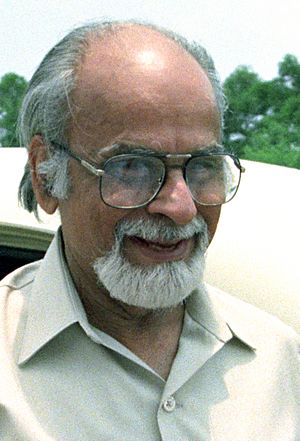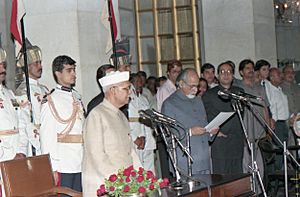Inder Kumar Gujral facts for kids
Quick facts for kids
Inder Kumar Gujral
|
|
|---|---|

Gujral in 1997
|
|
| 12th Prime Minister of India | |
| In office 21 April 1997 – 19 March 1998 |
|
| President | Shankar Dayal Sharma K. R. Narayanan |
| Vice President | K. R. Narayanan Krishan Kant |
| Preceded by | H. D. Deve Gowda |
| Succeeded by | Atal Bihari Vajpayee |
| Minister of Finance | |
| In office 21 April 1997 – 1 May 1997 |
|
| Prime Minister | Himself |
| Preceded by | P. Chidambaram |
| Succeeded by | P. Chidambaram |
| Minister of External Affairs | |
| In office 1 June 1996 – 19 March 1998 |
|
| Prime Minister | H. D. Deve Gowda Himself |
| Preceded by | Sikander Bakht |
| Succeeded by | Atal Bihari Vajpayee |
| In office 5 December 1989 – 10 November 1990 |
|
| Prime Minister | V. P. Singh |
| Preceded by | V. P. Singh |
| Succeeded by | Chandra Shekhar |
| 22th Leader of the House, Rajya Sabha | |
| In office June 1996 – November 1996 |
|
| Preceded by | Sikander Bakht |
| Succeeded by | H. D. Deve Gowda |
| In office April 1997 – March 1998 |
|
| Preceded by | H. D. Deve Gowda |
| Succeeded by | Sikander Bakht |
| Member of Parliament, Lok Sabha | |
| In office 1998–1999 |
|
| Preceded by | Darbara Singh |
| Succeeded by | Balbir Singh |
| Constituency | Jalandhar |
| In office 1989–1991 |
|
| Preceded by | Rajinder Singh Sparrow |
| Succeeded by | Yash |
| Constituency | Jalandhar |
| Member of Parliament, Rajya Sabha | |
| In office 8 July 1992 – 2 March 1998 |
|
| Constituency | Bihar |
| In office 3 April 1964 – 2 April 1976 |
|
| Constituency | Punjab |
| Ambassador of India to the Soviet Union | |
| In office 1976–1980 |
|
| Preceded by | Durga Prasad Dhar |
| Succeeded by | V. K. Ahuja |
| Personal details | |
| Born | 4 December 1919 Pari Darveza, Punjab, British India (present-day Punjab, Pakistan) |
| Died | 30 November 2012 (aged 92) Gurugram, Haryana, India |
| Monuments | Samata Sthal |
| Political party |
|
| Spouse |
Sheila Gujral
(m. 1945; died 2011) |
| Children | 2, including Naresh Gujral |
| Parent |
|
| Relatives | Satish Gujral (brother) |
| Alma mater | D.A.V. College, Hailey College of Commerce Forman Christian College University Panjab University |
Inder Kumar Gujral (born 4 December 1919 – died 30 November 2012) was an important Indian leader. He was a diplomat, a politician, and someone who fought for India's freedom. He served as the 12th Prime Minister of India from April 1997 to March 1998.
Contents
Early Life and Education
Inder Kumar Gujral was born on 4 December 1919. His family lived in a village called Pari Darveza. This village was in a part of British India that is now Punjab, Pakistan.
Student Life and Freedom Fight
As a student, Gujral joined the All India Students Federation. He also became a member of the Communist Party of India. He was part of India's fight for independence from British rule. In 1942, he was even put in jail during the Quit India Movement. This movement asked the British to leave India.
Gujral loved poetry and spoke Urdu. He was known for his love of the Urdu language. His wife, Sheila Gujral, was also a well-known poet. They got married on 26 May 1945. They had two sons, Naresh and Vishal. His younger brother, Satish Gujral, became a famous painter and sculptor.
Political Journey

After India became independent, Gujral joined the Indian National Congress party in 1964. He became a Member of Parliament in the Rajya Sabha. This is one of the two houses of the Indian Parliament.
Serving as a Minister
During a period known as "The Emergency," he was the Minister of Information and Broadcasting. This role involves managing news and media. In 1976, he became India's Ambassador to the Soviet Union. This meant he represented India in that country.
Later, in 1996, he became the Minister of External Affairs. This job is about handling India's relationships with other countries. During this time, he created a special foreign policy idea called the "Gujral Doctrine."
Becoming Prime Minister
In 1997, Inder Kumar Gujral was chosen to be the 12th Prime Minister of India. He was the third Prime Minister to come from the Rajya Sabha. Other Prime Ministers like Indira Gandhi and H. D. Deve Gowda also came from the Rajya Sabha.
As Prime Minister, Gujral had a special habit. He would meet with the general public every Friday morning. His time as Prime Minister lasted for less than a year. He retired from politics in 1998.
The Gujral Doctrine
The Gujral Doctrine is a set of five important rules. These rules help guide how India deals with its close neighbors, especially Pakistan. Gujral explained these rules in 1996.
Here are the five principles:
- First, with neighbors like Nepal, Bangladesh, Bhutan, Maldives, and Sri Lanka, India will give help and trust without expecting the same back.
- Second, no South Asian country will let its land be used against another country in the region.
- Third, no country will get involved in the internal matters of another.
- Fourth, all South Asian countries must respect each other's borders and independence.
- Finally, all disagreements will be solved peacefully through talks between the two countries involved.
Gujral believed that following these rules would make relationships in South Asia much better and more cooperative.
Later Life and Legacy
Inder Kumar Gujral passed away on 30 November 2012. He was admitted to a hospital in Gurgaon, India, because of a lung infection. He died just four days before his 93rd birthday.
The Indian government announced a seven-day period of mourning. Many official events were canceled. He was given a state funeral on 1 December near Samata Sthal. This is a memorial site in Delhi.
Gujral was also one of the people who signed an agreement to create a world constitution. This led to a meeting where people worked to draft a "Constitution for the Federation of Earth."
Honours and Awards
Gujral received several awards during his lifetime.
State Honours
| Decoration | Country | Date | Note | Ref. | |
|---|---|---|---|---|---|
| Bangladesh Liberation War Honour | 21 October 2012 | The second-highest honour of Bangladesh awarded to foreign dignitaries. | |||
Autobiography
- Matters of Discretion, I. K. Gujral, Hay House, India, 519 pages, Feb. 2011. ISBN: 978-93-8048-080-0.
Images for kids
-
Former PM Manmohan Singh paying floral tribute to Gujral.
-
Former Vice President of India Hamid Ansari giving tribute to Gujral on his first death Anniversary (2013).
See also
 In Spanish: I. K. Gujral para niños
In Spanish: I. K. Gujral para niños







